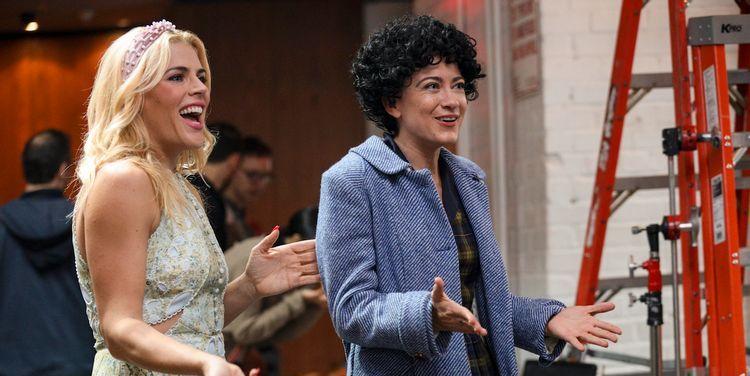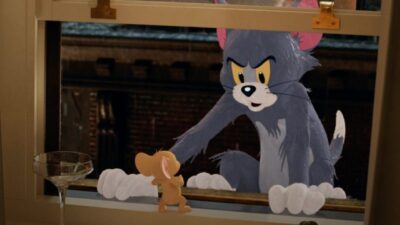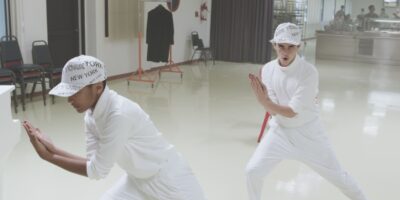It’s an unfortunate but inevitable reality for the trajectory of television shows: the moment of imminent downfall for the vast majority of narrative-based television. We’ve seen it in the sixth season of SUPERNATURAL, the seventh season of PARKS AND RECREATION, or any season of THE B*G BANG THE*RY. There was, however, a daywalker—an anomaly in the rift: SEARCH PARTY. The third season of SEARCH PARTY followed Dory, Drew, Elliot and Portia as they spiraled towards some form of indictment after the death of Keith Powell. The end of the season found Dory not guilty for a crime she did commit, and inadvertently had her develop a God complex. That complex doesn’t have much time to manifest; in the opening moments of S4, Dory wakes up in the trunk of her kidnapper.
From that point on S4 pays homage to some of its influences—MISERY and SILENCE OF THE LAMBS, most notably. Dory is held in a complete felt replica of her apartment and eventually hypnotized into skewing the events that had led her there (i.e. two murders, and her friends’ involvement). The level of captivation via the performances from Alia Shawkat (Dory) and Cole Escola (Chip) is unprecedented, but there is something even further in the nuance and layers of the show. As Portia, Elliot, and Drew start to investigate Dory’s disappearance, the real genius of SEARCH PARTY is revealed as it toes an inscrutable line between surrealism and absurdity, in turn revealing the ridiculousness of our actual reality. It can be found in small details, like the sticky bun helmets worn at the Little Stickys Factory, or Charlie in the hospital after having a book fall on her head, or in larger plot points, like Elliot being given bedazzled guns and becoming an icon for queer Republicans, Portia being cast as Dory in the Dory Sief biopic, or a grown woman incapable of dropping the theme park princess shtick, proposing via song in a parking lot.

We laugh when these things happen because they feel distant or vapid in relation to reality, but SEARCH PARTY reminds us that it’s not strictly fiction—these entities and jokes do not exist in a vacuum. The show expertly blurs the line between illusion and delusion. When Drew finds a sense of fulfillment in playing the mascot-headed Beast at a theme park, is that delusional? Or is he simply living in an illusion without fault or flaws? Is Portia delusional for acting as Dory in a completely falsified, sensationalized film? Or is she living in an illusion that she’s protecting a friend’s image and finding her own place following her dreams? When Elliot agrees to rebuke his whole community for money and power, is he delusional? Or is he living in the illusion that he has finally, against all odds, made something of himself? The truth is there is no real right answer. The question, even to the audience, will always be rhetorical. Chip is assumedly staunchly delusional—or is he?—killing people and torturing others in search of earnest friendship. Dory is diametrically opposite in an illusion that after three seasons she has found out who the fuck she really is: a normal person.

Despite the web of lies, humor, and intrinsic darkness between the vastly different seasons, there is a common throughline: the concept that life is not a film. Before we give credit to TikTok for revealing “main character syndrome,” let’s give credit where credit is due. These characters, for years, have been on a quest to discover who they are, earnestly discovering what the hell it means to “find yourself.” It has to be like the media we see: where is our “Eat, Pray, Love,” so to speak? Yet, their lives remind them it does not exist. Dory finds Chantal was not in any real trouble or danger, Elliot discovers that people are usually not hyperfocusing on you, Portia discovers your interests are not your life, and Drew realizes that taking ownership over your situation can be good, actually. This gambit of rapscallions expect fireworks, bad guys, and happy endings but these things cannot and do not exist. The show creators have dropped them in a vat of irony as they are surrounded by campy, larger-than-life characters and situations but unfortunately, they will still always be simply mundane, faulted people.
The scene, a personal favorite, in which all four phases of Dory create a mosaic of a woman looking for a semblance of heighetend personhood at her own funeral, but never discovers it, is scripture. Then to follow it, a poignant scene where Elliot, Portia, and Drew illustrate an illusory life they could and should live, completely delusional to the fact that they covered up someone’s death, is revelatory. Those two scenes, in conjunction, put a cherry on top that allows us to realize the point of the show and make peace with its possible end. SEARCH PARTY is whimsical, hysterical, heart-wrenching, and some of the best television ever created.
P.S. GIVE ALIA SHAWKAT AND COLE ESCOLA THE EMMY OR YOU’RE TRANSPHOBIC AND QUEERPHOBIC AND DEVOID OF TASTE.
















Comments